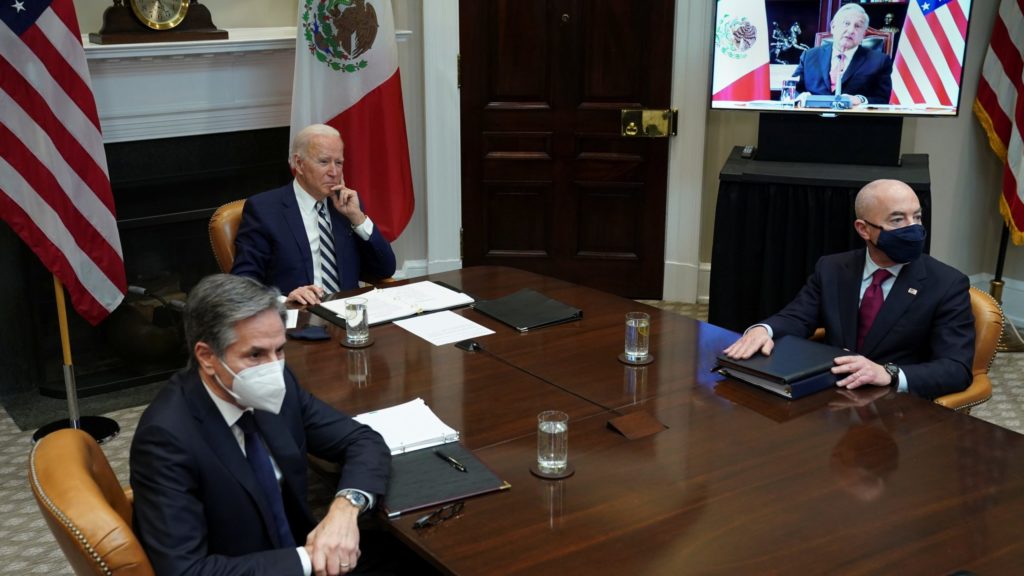The Biden administration announced April 27 new steps it would take in an effort to reduce migrant arrivals at the U.S.-Mexico border when Title 42 expires in May.
In remarks at the State Department, Secretary of State Antony Blinken and Secretary of Homeland Security Alejandro Mayorkas said the administration would set up migrant processing centers in Latin America to screen those seeking entry as to whether they have a legal pathway.
The administration also will expand legal pathways for entry, while increasing deportations of those who enter the United States unlawfully.
Blinken said the centers would "improve qualified individuals' access" to refugee resettlement, family reunification and lawful settlement in the U.S. or other countries.
"These centers will take a hugely important step to prevent people from making the dangerous journey to the border by providing a much safer, legal option to migrate that they can pursue in and from their own countries," Blinken said.
Mayorkas said that "when people have safe and orderly pathways to come to the United States, and face consequences for failing to do so, they use those pathways."
Title 42 is a part of federal U.S. public health law granting the federal government some authority to implement emergency action to prevent the spread of contagious diseases by barring some individuals from entry.
Then-President Donald Trump implemented the policy in 2020 at the onset of the COVID-19 pandemic, but the move was seen as part of his administration's broader attempts to reduce migration. The use of Title 42 to expel migrants at the southern border was criticized by some public health experts, who argued it was politically motivated rather than evidence-based.
Since then, Title 42 has been invoked more than 2.7 million times to expel migrants, including those seeking asylum, according to U.S. Customs and Border Protection data. Title 42 is set to end May 11.
In a statement issued late April 28, Bishop Mark J. Seitz of El Paso, Texas, chairman of the U.S. Conference of Catholic Bishops' Committee on Migration, said the bishops "strongly support increased refugee resettlement from Latin America and the Caribbean as a reliable pathway to lasting safety for those who have been forcibly displaced."
He said the bishops "look forward to its close coordination with civil society and Congress to ensure the successful integration of these newcomers." Bishop Seitz added that resources used for this "should not undermine existing access to resettlement for other refugees or impede the proper functioning of immigration processes generally."
The bishops "are relieved that the Administration does not plan to detain vulnerable families, given the unjustifiable and immoral harms of doing so," Bishop Seitz continued, but they also "are greatly concerned that such families, including those with young children, and others will be subjected to rushed proceedings without meaningful due process."
The administration's continued "reliance on expedited removal" coupled with "severe restrictions on asylum eligibility and access" is concerning, Bishop Seitz said, adding that those "most desperately in need of relief" will "bear the brunt of these measures."
He acknowledged the "challenge of forced migration facing our country and hemisphere" is "complex" and said that achieving "the conditions necessary to sustainably reduce irregular migration" will only happen by overhauling the U.S. immigration system and making a long-term commitment to address root causes of migration and promote "integral human development throughout the Americas."
J. Kevin Appleby, interim executive director of the Center for Migration Studies, told OSV News April 27 that the Biden administration's announcement seems "a positive step forward."
"Of course, as always, it depends on how something is implemented and what resources are devoted to the implementation that will decide whether it's successful or not," Appleby said.
"But it gives asylum- seekers an opportunity to tell their stories and have their cases adjudicated without taking a dangerous journey north."
Appleby, a former adviser on migration policy for the U.S. bishops, said that for the last quarter century, "Congress has not had the political courage to reform the immigration system."
"So it's left to the executive branch to come up with these responses, when Congress should be working with the administration to pass legislation to overhaul our immigration laws," he said.
Republicans have made immigration a key part of their criticism of the Biden administration, accusing him of lax policies. In a statement reacting to Biden's 2024 reelection bid, former President Donald Trump, in the midst of his third bid for the White House after Biden defeated him in 2020, said, "Under Biden, the Southern Border has been abolished -- and millions of illegal aliens have been released into our communities."
A fact sheet from the State Department about the new actions said, "The lifting of the Title 42 order does not mean the border is open."
The fact sheet said that any individuals who unlawfully cross the U.S. southern border after Title 42 is lifted will be processed for expedited removal, barred from reentry for at least five years if they are ordered removed and would be ineligible for asylum "absent an applicable exception."
"To avoid these consequences, individuals are encouraged to use the many lawful pathways the United States has expanded over the past two years," the fact sheet said.
The U.S. bishops and other Catholic immigration advocates have criticized Title 42 as well as the Biden administration's continued use of the Trump-era policy.

